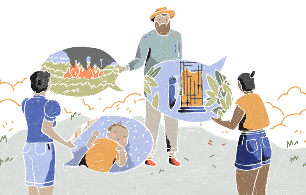
We all have one, and identifying yours is the first step in becoming an advocate for climate action.

We are facing a climate crisis of epic proportion—one that threatens life on Earth as we know it. For people and birds to have any chance of adapting, the response needs to be no less massive. But that doesn’t mean you can’t start at home. Personal actions reduce our own contributions to climate change, sometimes significantly. Just as important, they have a ripple effect: When people see others in their community taking action, they are much more likely to do so themselves. The technical term for this is “social norm,” but let’s just call it doing your part to help save the world.

We all have one, and identifying yours is the first step in becoming an advocate for climate action.

Spread climate solutions by taking visible actions in your community.

Easy tips for getting from A to B without emitting so much C.

"Last year, my husband and I bought our first car since 2004. We wanted something that used as little fossil fuel as possible, but we were hesitant to get an all-electric vehicle that would require regular charging on our annual trip from New York City to the Midwest for the holidays. We ended up with a plug-in hybrid—the perfect compromise. The battery provides a 60-mile range per full charge for local travel, and the gas engine kicks in when we’re out of juice on longer drives. Now our biggest challenge is ensuring that the electricity for each charge is green, so we opt into our utility’s wind-energy plan at home."
—Elizabeth Sorrell, Audubon's vice president of engagement, and a 2018 Chevy Volt owner

America’s largest irrigated crop isn’t corn or soy—it’s grass.

Number of gallons of gas each person would save by swapping beans for a five-ounce steak one day a week for a year. Or, to put another way, that's a five percent decrease in a typical home’s annual electricity use.
BE REALISTIC Once you grasp the urgency of the climate crisis, it’s easy to feel bad about not doing more. "Coming from that mindset is natural and understandable, but it's counterproductive," says climate psychologist Renee Lertzman. We get the most done when we have compassion for ourselves, accept our shortcomings, and view each day as a chance to live closer to our values.
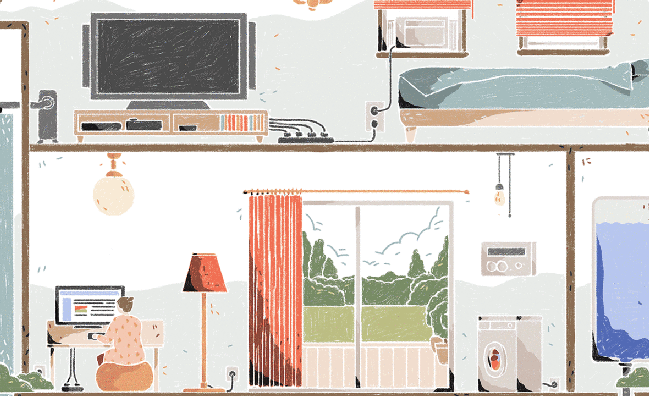
Having a low-carbon house isn’t just better for the world—it will also save you serious money.

With your own carbon footprint under control, it’s time to level up your impact by encouraging those around you to take climate actions. But where to start? Consider the local communities and spaces where you already have connections and influence—your child’s school, say, or a social hub like a coffee shop. By merely showing up and making your case, you can lead others toward climate-friendly policies and practices. It’s not always easy, but it’s often productive—and rewarding. Along the way, you’ll develop new relationships and skills that will help you become an ace climate advocate.
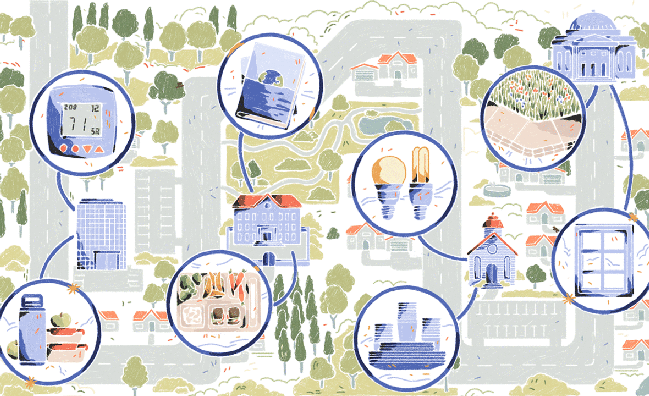
Climate-action tips for greening your town.

"I unexpectedly had the opportunity to run in a special election. I was a newcomer to St. Paul, though a lifelong Minnesotan. I had about 10 days to actually make a campaign. What should people considering this think about? Local politics can feel entrenched—like, oh, I have to have been a homeowner for 25 years in this community and have super-deep networks to jump in and try to lead. I didn't have any of that. I struck out on my own to say: I believe what our community really needs right now is a new perspective for the future."
—Mitra Jalali Nelson, Ward 4 council member in St. Paul, Minnesota, one of 25 cities selected so far for the National League of Cities' Leadership in Community Resilience Program.



It's more productive than a Facebook rant.
Pick Your Newspaper if you want to influence a specific decision maker, choose a paper they read. A local or regional print publication is a good bet.
Get to the Point Make one point in your letter, and make it well. Keep it between 150 and 200 words.
Make It Personal Tell your climate story to emphasize why you care. Include no more than the one fact needed to support your main point.
Don't Hold Back Tell readers what you want to get done or them to do. Be precise and aggressive.
But Don't Be Too Aggressive Do not attack individuals or groups of people. Stick to your point.
Find a Proofreader Before submitting your letter, have a friend or trusted colleague read it for clarity and errors.



Number of years it can take a new building to overcome the climate impacts of its construction. When possible, retrofitting existing buildings—for example, by upgrading HVAC or electrical systems—should be the priority for cities and towns.
STAY FOCUSED People confuse worrying about climate change with taking action, says psychotherapist Rosemary Randall. Getting involved with an organization, like Audubon, can help—it’s easier to make a tangible impact with a group, and that reaffirms your sense of agency. Terror is not a durable motivation. Much healthier: social justice and preservation of the natural world.

Climate change is already causing people to relocate. As more hometowns become inhospitable, yours might be able to help.

Farm-to-table is the buzzword, but too often farm-to-landfill is the reality.

By working with nature, not against it, we can mitigate climate disasters while creating vital habitat.

Ready to really start making an impact? Good, because now it’s time to tackle the entrenched systems and political stagnation that can greatly contribute to climate change at the state and regional levels. It’s here that we need to advocate for things like fast and innovative grid transformation, forward-thinking climate policies, and institutional reform. There’s no question that driving change is challenging work. The key is recruiting allies and being thoughtful about your strategies and goals. With the right partnerships and planning, you can wield influence that once might have seemed unimaginable.
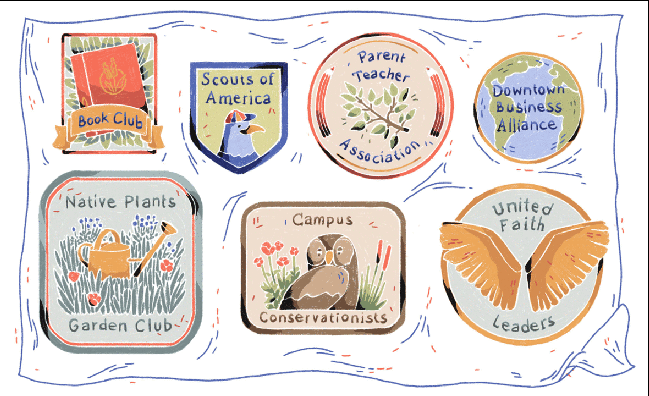
When fighting for a cause, you can't just mobilize—you have to organize.
Number of phone calls needed to make a South Carolina representative "feel like their doors are being blown off," says Tara Spicer, a Republican strategist in the state, which has a medium-size population. Adjust for the size of your state accordingly, pick your issue, and start dialing.
GET OUTSIDE Advocating for major change can be exhausting, so take time to remember what you're saving. Go birding, and go often. You can even turn this breather into an action by joining Audubon’s Climate Watch program, which tracks how climate change affects certain species. “I have a passion for counting birds,” says Leif Anderson, an avid Climate Watch volunteer. “It’s a fun, easy community-science project, and it’s something one person can do.”

"I didn't know what to expect on my first lobby day. I didn't know how close we would get to these individuals, or if we'd even get to talk to them. Luckily we did get to talk to a few, and the representatives, for the most part, we're really nice. Going in with that uncertainty is kind of exciting. But it's also encouraging when you get there and you have this whole group that you're planning out the conversation with, knowing that you're all there to support each other and get the same message across. That was neat and comforting. I look forward to my next one."
—Sara Wrenn, member of the University of North Carolina Asheville's Audubon campus chapter, on attending a lobby day with Audubon North Carolina to advocate for rewewable-energy policy.

These are the gatekeepers to the grid reform we need.
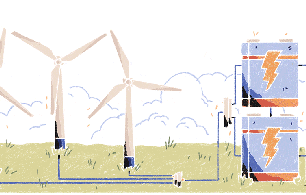
To make a real dent in climate change, we have to go big on renewables—but an outdated power grid is getting in our way.

To broaden your regional impact as a climate advocate, take a cue from these two cases.


Remember: Your state representatives work for you.

Make no mistake: The most important climate action you can take at any level, but especially at the national one, is to vote for political candidates who are ready to take meaningful steps toward curbing carbon emissions and tackling climate change. The second-most important action involves deeper, harder work: supporting a movement that is inclusive of all and representative of those without power. Our path to a greener future must be one in which everybody has a say—most of all those who are already suffering from a warming planet. Climate change is a crisis, but it can also be an opportunity to create a more just world.
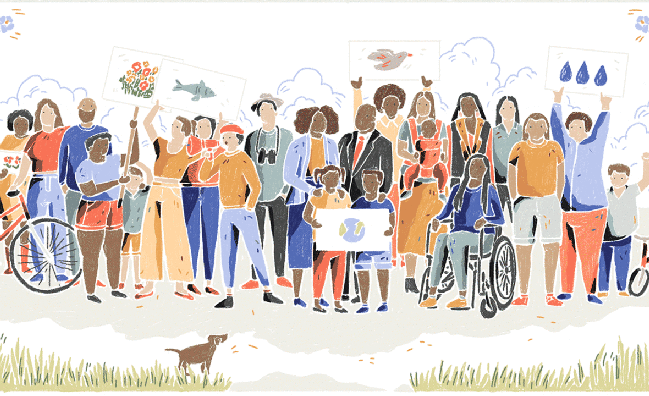
When it comes to creating nationwide change, there is strength in both diversity and numbers.
The number of countries in which people joined the September 20th Global Climate Strike inspired by 16-year-old Swedish activist Greta Thunberg. More than 4 million people are estimated to have participated in the protest worldwide. Don't forget: You are not alone.
PRACTICE PATIENCE Climate denial tends to be rooted in a person's identity or ideology; all the facts in the world won't change their mind, according to atmospheric scientist and communication whiz Katharine Hayhoe. So avoid frustrating arguments. Instead, start with shared values—economic security, or a faith-based sense of stewardship—and discuss how a changing climate puts that common ground at risk. Then explore solutions to protect what you both care about.

“Climate change is something everyone can be engaged in at every part in our democracy. State legislators are just as important as members of the U.S. Congress. Municipal candidates are very important—particularly for dealing with land-use issues and transportation issues, which are so important in reducing our carbon emissions. People at the dinner table are important, and in their churches and synagogues. Talking to your friends and neighbors is important. We influence each other. We’re all leaders now—we’re all publishers, we all have social networks. And I encourage people to share their views with others. This is all-hands-on-deck, from the president down to Audubon members.”
—Jay Inslee, governor of Washington and 2019 Democratic candidate for the president of the United States

Five years after our first special climate issue looking at Audubon's groundbreaking Birds and Climate Change report, we explore Audubon's newest climate science and the solutions people are already implementing to save birds into the future.

Make change on a local level by becoming a climate advocate.










Explore how North American birds are responding to climate change by participating in Climate Watch. Here's how to get started.

Bird-friendly landscaping provides food, saves water, and fights climate change.
Let us send you the latest in bird and conservation news.
